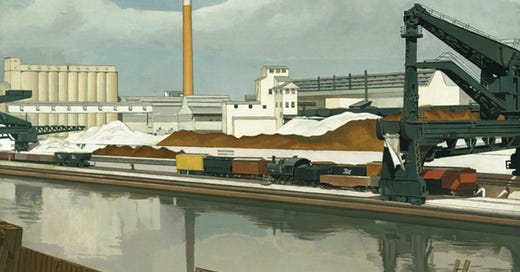Hey there!
I used to have a plant, that began dropping one day, very mildly, and I used to think this evening, I’ll water it. Never did, something always came up, and this got pushed to the next day. It was a simple thing to do, but perhaps it was its triviality that was the reason it never got done. One day passed after another, the plant completely wilted one morning.
The most violent thing I have ever done.
Three disparate readings over the past few weeks triggered some strong thoughts in me. As such this letter is a first draft of those thoughts, the entrance to a labyrinth, and perhaps the idea at its centre is a raging minotaur best avoided. Who knows?
Things
What happened is, we grew lonely living among the things, so we gave the clock a face, the chair a back, the table four stout legs which will never suffer fatigue.
Maintenance
Stewart Brand is writing a book called Maintenance: of Everything. To highlight the primacy of the topic, Brand intended to start it with a dramatic interpretation of one of the most extreme sailboat race in modern history. Works in Progress published that story in its 8th edition, and it is by far the most enriching and exhilarating writing I have read this year. This is the crux of it in Brand’s words:
... the Golden Globe around-the-world solo sailboat race of 1968. Its drama continues to echo half a century later because three of the nine competitors became legendary – the one who won, the one who didn’t bother to win, and the one who cheated.
Their stories are usually told as a contest of wills and endurance, but at heart, it was a contest of maintenance styles. To quote Brand -- The competitors knew that if they didn't keep their boats absolutely fit, the ocean would kill them.
Last night I finally got around to reading Robin Sloan's call for a new protocol as opposed to platforms for creators and their followers to connect. Called Spring 83, the project is already taking an interesting shape.
However, the thing that caught my eye was a segment where he talks about maintaining things on the web. He shares a conversation he had with a friend on Mary Shelley's Frankenstein -
... Hannu lamented the novel’s common portrayal as a cautionary tale about scientific hubris. In fact, Hannu argued, Frankenstein’s tragic mistake was not creating the monster. Mary Shelley makes this very, very clear: the great mistake was abandoning him.
Couple of weeks back at my new workplace, a colleague shares this on our common group -
Nonprofits May Need to Spend a Third of Their Budget on Overhead to Thrive
The article goes on to state the paradox how donors expect the maximum of their money to be used for the benefit of the beneficiaries, whereas, the organisations that create the most impact are those that divert enough resources to their own maintenance.
Modern Victor Frankensteins
Fact is, when you buy or invest in something, you are also signing up to maintain it. More machines and tools and things break down over lack of use and corrosion than of overuse. Companies know this. They would rather us buy new ones than fix the old. And our obedience on this around everything from consumer goods to content creates a loop of bad products, poorly maintained, constantly replaced. And where is that getting us?
A major influence on Stewart Brand was the philosophies of Buckminster Fuller. Fuller's own inventions and ideas were influenced by a simple motto - Make more with less. It is a simple, four word manifesto but a powerful one, in effect showcasing the power of few. The fewer things that go in to its making the faster it gets done, the better the sum works, the easier it is to maintain, and the lesser the things we will need in our lives. The world today has embraced making more, but has ignored the idea of with less.
Today we are all Victor Frankensteins buying and making and then abandoning things as we move onto newer and glitzier things. We are simultaneously distracted and distracting everyone along the way. Passionate about everything, and committed to nothing. Everything gets our identity stitched onto it and suddenly everything simple has to be complex because how can we be that… simple? We are left with complex things that get little done and keep breaking down for the very reason. But that is not a problem, the next thing is already on its way.
Charles Sheeler and America
(Source)






Stumbled upon the Stewart Brand piece on your twitter page and I agree wholeheartedly- It is one of the best long reads that I've come across this year.